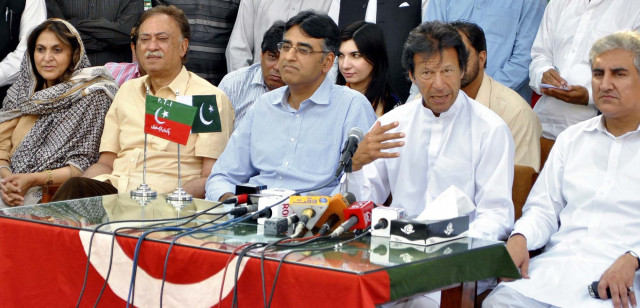Civil society terms proposed act ‘unrepresentative’
Claim the system of Punjab is being imposed on the capital by PML-N.

PTI will oppose the act in parliament and will force the ruling Pakistan Muslim League-Nawaz to enact a law which is truly representative of the public, says Asad Umar. PHOTO: SANA
“The bureaucracy wants a crippled system of local governance in the capital which is not acceptable to the two million residents of the city,” said Executive Director Centre for Civic Education Pakistan (CCEP) Zafarullah Khan. He said that Islamabad’s residents, the main stakeholders in the local government, were not consulted while making this law. Khan said that the people of Islamabad want a LG system which ensures their complete participation. He demanded that the government make the law public so city residents can debate its drawbacks.
Khan said the urban areas of Islamabad would have representation in a local government system for the first time ever.
National Coordinator PATTAN Development Organisation Sarwar Bari, whose organisation has previously protested against the act, also criticised the proposal and said the government is trying to impose the act being implemented in Punjab, which is not acceptable. “Without taking the public onboard, how can the government enact this law,” he asked.
Bari said the government must ensure a minimum of 21 members at union council level, with 33 per cent seats reserved for women, 20 per cent for peasants and workers and ten per cent for minorities.
Pakistan Tehreek-e-Insaf’s Member National Assembly from capital’s NA-48 seat, Asad Umar, criticised the act, saying that the government is trying to impose the system of Punjab in Islamabad. He said that his party will oppose the act in parliament and will force the ruling Pakistan Muslim League-Nawaz to enact a law which is truly representative of the public.
Former Islamabad High Court Bar Association president Nayab Hassan Gardezi also said that civil society had not been taken onboard. “How can the government have an LG system in the capital without knowing the views of the local public,” he asked. He urged the opposition parties to start a debate on the issue before the government submits the act in parliament.
Published in The Express Tribune, September 9th, 2013.



















COMMENTS
Comments are moderated and generally will be posted if they are on-topic and not abusive.
For more information, please see our Comments FAQ